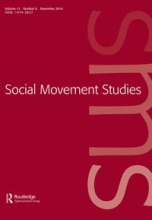
June 7, 2016
The information environment that social movements face is increasingly complex, making traditional assumptions about media, messaging, and communication used in social movement studies less relevant. Building on work begun within the study of digital protest, we argue that a greater integration of political communication research within social movement studies could offer substantial research contributions. We illustrate this claim by discussing how a greater focus on audiences and message reception, as well as message context, could advance the study of social movements. Specifically, we discuss a range of topics as applied to movement research, including information overload, selective attention, perceptions of bias, the possibilities that entertainment-related communications open up, and priming, among other topics. We suggest the risks of not adapting to this changing information environment, and incorporating insights from political communication, affect both the study of contemporary (including digital) protest, as well as potentially historical protest. The possibilities opened up by this move are immense including entirely new research programs and questions.
Jennifer Earl & R. Kelly Garrett (2017) The new information frontier: toward a more nuanced view of social movement communication, Social Movement Studies, 16:4, 479-493, DOI: 10.1080/14742837.2016.1192028







